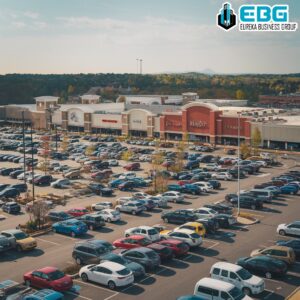- Home
- Retail
- Retail Investors Resources
- The Parking Pitfall: Are You Overlooking This Retail Real Estate Essential?
The Parking Pitfall: Are You Overlooking This Retail Real Estate Essential?
Commercial Leasing: Why Parking Can Be Your Make-or-Break Factor
In the world of retail real estate, there’s a hidden giant that can quietly derail your business before it even begins. It’s not flashy signage, high-tech amenities, or even a prime location. It’s something far less glamorous: parking…
As a seasoned real estate broker in the Dallas-Fort Worth market, I’ve seen countless deals stumble over this critical yet underestimated element of commercial leasing. Parking is more than just a convenience; it’s sometimes the lifeblood of your business operations, customer satisfaction, and legal compliance.
Let’s break this down, so you can avoid the parking pitfalls that trip up so many in retail real estate.
The Underestimated Giant of Commercial Leasing
Parking isn’t just about ensuring your customers or employees have a place to park. In commercial leasing, it’s an integral part of city zoning and occupancy regulations.
For instance, cities enforce minimum parking requirements that vary by property type and intended use. A retail store might need one parking space for every 200 square feet, while a restaurant could require one space for every 100 square feet (every city has their own code and ratios they adopted so make sure to ask the right people!). If the property’s parking capacity doesn’t meet these requirements, you won’t be able to secure a Certificate of Occupancy (CO).
This isn’t just a theoretical issue. I’ve seen tenants sign leases, pay deposits, and even begin renovations, only to find out later that their business couldn’t legally operate due to parking limitations.
Consider this scenario:
A retail center has 25 parking spaces, just enough to support its existing tenants. But when a new tenant moves in with a higher parking demand, such as a restaurant, the numbers no longer add up. Suddenly, the new tenant can’t get a CO, and the ripple effects are felt by everyone on the property.
Why Parking is More Than Just a Numbers Game
For landlords, inadequate parking can lead to higher tenant turnover and longer vacancies. For tenants, it’s a potential operational nightmare that could cost months of delays, lost revenue, and reputational damage.
Here are some common consequences of overlooking parking:
- Denied Occupancy Permits: Without enough parking, your business can’t legally open its doors.
- Strained Tenant Relationships: Existing tenants may face increased competition for limited parking, leading to complaints or even departures.
- Lost Deals: Landlords could struggle to fill vacancies if parking limitations deter high-demand tenants.
Whether you’re the landlord or the tenant, parking is a shared challenge—and a solvable one if addressed early.

Three Steps to Avoid Parking Pitfalls
- Investigate Zoning and Usage Early
Zoning codes vary between cities, and requirements can be complex. Work with your broker to verify parking ratios based on your intended business use. For example, a dentist office may have different requirements than a traditional retail store, even in the same shopping center complex. - Understand the Tenant Mix
In multi-tenant properties, your parking allocation isn’t just about your space—it’s about everyone else’s, too. A retail center with a balanced mix of low-traffic tenants (like offices) and high-traffic tenants (like restaurants) will have very different parking dynamics than one with predominantly high-traffic tenants. - Communicate and Plan
This is where the expertise of a skilled broker makes all the difference. Whether you’re the landlord rep negotiating leases or the tenant rep helping your client select a new site, having open conversations about parking needs and limitations ensures that there are no unpleasant surprises down the road.
Parking as a Competitive Advantage
Here’s the twist: instead of seeing parking as a problem, savvy landlords and tenants can use it as an opportunity. Properties with ample, well-managed parking are increasingly seen as premium spaces in competitive markets like Dallas-Fort Worth.
As a landlord, investing in efficient parking layouts, shared parking agreements, or even innovative solutions like valet services can make your property more attractive to tenants. As a tenant, knowing your parking needs and planning accordingly positions you as a desirable leaseholder who can maximize the potential of the space. You can even leverage a statement like “…my usage requires a lot less parking than others so the landlord can have more high-demand tenants when I’m in the mix!” during your lease negotiations!
Don’t Let Parking Derail Your Next Deal!
Navigating the complexities of commercial leasing in high demand markets like Dallas-Fort Worth requires an eye for details, and parking is no exception. Whether you’re signing a new lease, negotiating tenant improvements, or considering property acquisition, taking the time to address parking early will save you time, money, and headaches.
Did you lose a deal over parking issues?
Have you ever had a deal complicated by parking issues? How did you overcome them? Share your experiences in the comments—I’d love to hear your insights, we could all learn some new ways to resolve parking challenges in commercial leasing…
#EBG #RetailNavigator #DFWRealEstate #RetailSuccess #CommercialLeasing

